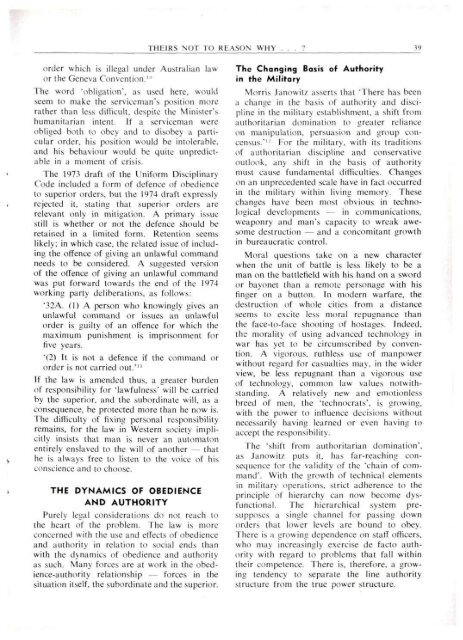ISSUE 1 : Nov/Dec - 1976 - Australian Defence Force Journal
ISSUE 1 : Nov/Dec - 1976 - Australian Defence Force Journal
ISSUE 1 : Nov/Dec - 1976 - Australian Defence Force Journal
Create successful ePaper yourself
Turn your PDF publications into a flip-book with our unique Google optimized e-Paper software.
THEIRS NOT TO REASON WHY jgorder which is illegal under <strong>Australian</strong> lawor the Geneva Convention." 1The word 'obligation', as used here, wouldseem to make the serviceman's position morerather than less difficult, despite the Minister'shumanitarian intent. If a serviceman wereobliged both to obey and to disobey a particularorder, his position would be intolerable,and his behaviour would be quite unpredictablein a moment of crisis.The 1973 draft of the Uniform DisciplinaryCode included a form of defence of obedienceto superior orders, but the 1974 draft expresslyrejected it, stating that superior orders arerelevant only in mitigation. A primary issuestill is whether or not the defence should beretained in a limited form. Retention seemslikely; in which case, the related issue of includingthe offence of giving an unlawful commandneeds to be considered. A suggested versionof the offence of giving an unlawful commandwas put forward towards the end of the 1974working party deliberations, as follows:'32A. (1) A person who knowingly gives anunlawful command or issues an unlawfulorder is guilty of an offence for which themaximum punishment is imprisonment forfive years.'(2) It is not a defence if the command ororder is not carried out.'"If the law is amended thus, a greater burdenof responsibility for 'lawfulness' will be carriedby the superior, and the subordinate will, as aconsequence, be protected more than he now is.The difficulty of fixing personal responsibilityremains, for the law in Western society implicitlyinsists that man is never an automatonentirely enslaved to the will of another — thathe is always free to listen to the voice of hisconscience and to choose.THE DYNAMICS OF OBEDIENCEAND AUTHORITYPurely legal considerations do not reach tothe heart of the problem. The law is moreconcerned with the use and effects of obedienceand authority in relation to social ends thanwith the dynamics of obedience and authorityas such. Many forces are at work in the obedience-authorityrelationship - forces in thesituation itself, the subordinate and the superior.The Changing Basis of Authorityin the MilitaryMorris Janowitz asserts that 'There has beena change in the basis of authority and disciplinein the military establishment, a shift fromauthoritarian domination to greater relianceOD manipulation, persuasion and group concensus.'1 - For the military, with its traditionsOf authoritarian discipline and conservativeoutlook, any shift in the basis of authoritymust cause fundamental difficulties. Changeson an unprecedented scale have in fact occurredin the military within living memory. Thesechanges have been most obvious in technologicaldevelopments — in communications,weaponry and man's capacity to wreak awesomedestruction — and a concomitant growthin bureaucratic control.Moral questions take on a new characterwhen the unit of battle is less likely to be aman on the battlefield with his hand on a swordor bayonet than a remote personage with hisfinger on a button. In modern warfare, thedestruction of whole cities from a distanceseems to excite less moral repugnance thanthe face-to-face shooting of hostages. Indeed,the morality of using advanced technology inwar has yet to be circumscribed by convention.A vigorous, ruthless use of manpowerwithout regard for casualties may, in the widerview, be less repugnant than a vigorous useof technology, common law values notwithstanding.A relatively new and emotionlessbreed of men, the 'technocrats', is growing,with the power to influence decisions withoutnecessarily having learned or even having toaccept the responsibility.The 'shift from authoritarian domination",as Janowitz puts it. has far-reaching consequencefor the validity of the 'chain of command'.With the growth of technical elementsin military operations, strict adherence to theprinciple of hierarchy can now become dysfunctional.The hierarchical system presupposesa single channel for passing downorders that lower levels are bound to obey.There is a growing dependence on staff officers,who may increasingly exercise de facto authoritywith regard to problems that fall withintheir competence. There is, therefore, a growingtendency to separate the line authoritystructure from the true power structure.
















